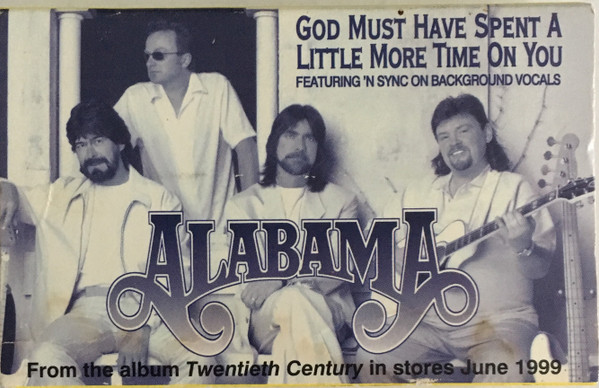
A reverent love song sung like a thank-you—“(God Must Have Spent) A Little More Time on You” finds Alabama opening their arms to a new generation and discovering that tenderness only grows richer with age.
Key facts first. In 1999, Alabama cut “(God Must Have Spent) A Little More Time on You” with guest harmonies from ’N Sync, releasing it as a single on April 26, 1999 and folding it into the album Twentieth Century a few weeks later. The record became a late-career hit: No. 3 on Billboard’s Hot Country Songs, No. 29 on the Hot 100, and No. 1 on Canada’s RPM Country Tracks; the U.S. 7-inch/CD single carried “Sad Lookin’ Moon” on the flip. The parent album arrived on June 15, 1999, peaking at No. 5 on Top Country Albums and No. 51 on the Billboard 200. The song itself—written by Carl Sturken and Evan Rogers—had been a pop hit the year before for ’N Sync (U.S. Hot 100 No. 8), which makes Alabama’s version a rare, graceful handclasp between country elders and the new teen-pop wave.
What makes Alabama’s reading linger isn’t novelty—it’s tone. Where ’N Sync shaped the lyric as a tender pop devotion, Alabama lets it breathe like a front-porch blessing. Randy Owen’s steady lead, framed by Jeff Cook and Teddy Gentry’s familiar blend, turns the praise inward and homeward; the song becomes less about spectacle than about gratitude for the person standing right in front of you. Producer Don Cook (with the band) keeps the frame clean—lightly electrified guitars, a rhythm section that moves rather than flexes, harmonies that rise like a congregation rather than a choir trying to out-sing itself. On radio it sounded unhurried and assured, the work of musicians who know that sincerity is its own kind of power. (If you remember the official video, with both groups sharing screen and song, you’ll remember how natural that kinship felt.)
The lyric’s grace is its plainness—“you” is given the weight of a small miracle. Older listeners hear not a Hallmark flourish but a familiar truth: when love lasts, it’s because someone took time—to listen, to forgive, to stay. Alabama doesn’t gild that idea; they affirm it. The verses read like a thank-you offered across a kitchen table; the chorus blooms just enough to let the room exhale. It’s the language of everyday devotion, sung by a band that’s always trusted ordinary rooms—VFW halls, church basements, living-room stereos—to carry the message farther than any fireworks could.
There’s also a quiet historical sweetness to the collaboration itself. By 1999, Alabama were three decades into a run that pulled country into the mainstream without sanding off its warmth; ’N Sync, meanwhile, were introducing a new generation to harmony singing and unabashed sentiment. Meeting in the middle, they proved that generosity is contagious: veterans making space on a country single for pop voices, and pop stars lending their glow to a country prayer. The chart line tells that story plainly—Top-3 country, a Hot 100 presence strong enough to reach listeners who didn’t think they were “country fans.”
Inside Twentieth Century, the track does careful work. Sequenced among roadhouse shuffles and mid-tempo radio fare, it changes the air, reminding you that this band—famous for dance-floor kickers and highway hooks—also knows how to speak softly. The album’s solid chart run (Country No. 5, Pop No. 51) suggests that fans welcomed that balance: a veteran group renewing its vows to melody and to manners at the close of a century it helped soundtrack.
What does it mean now? For many of us, the song has aged into a modest benediction. You can play it at a wedding or let it keep you company at the sink after dinner, and it feels right either way. The title frames a big idea with kitchen-table humility: maybe the person you love is evidence that the world can, sometimes, take extra care. That feeling—the mix of awe and everydayness—is why the record endures. It doesn’t ask you to believe in grand gestures; it asks you to notice the care that holds a life together.
And so “(God Must Have Spent) A Little More Time on You” sits in Alabama’s catalog like a late-day sunbeam: gentle, flattering, honest about the years. It remembers, without embarrassment, that tenderness is not a fad; it’s a practice. A country band and a boy band met on common ground to say so—and the result still warms a room the way only a simple, well-kept promise can.